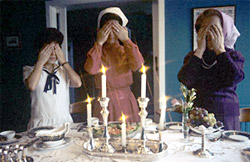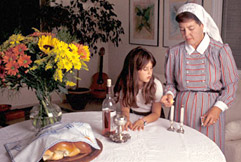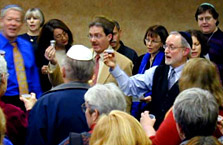 The word Sabbath comes from the Hebrew word for "rest." The Sabbath is the day Jews can relax, be with family, study, and reflect. Complete rest is observed on this day and even cooking is forbidden on this day. It is the weekly day of rest in Judaism. It is observed, from before sundown on Friday until after nightfall on Saturday, by many Jewish people with varying degrees of involvement in Judaism. The day of the Sabbath, it is believed, was created "in the beginning" when God created the world. Yet, although the seventh day was created as a day of rest from the very beginning, it was not a specific commandment to rest on the seventh day. Two thousand years later, it was observed as a rest day when the Ten Commandments were given at Mount Sinai.
The word Sabbath comes from the Hebrew word for "rest." The Sabbath is the day Jews can relax, be with family, study, and reflect. Complete rest is observed on this day and even cooking is forbidden on this day. It is the weekly day of rest in Judaism. It is observed, from before sundown on Friday until after nightfall on Saturday, by many Jewish people with varying degrees of involvement in Judaism. The day of the Sabbath, it is believed, was created "in the beginning" when God created the world. Yet, although the seventh day was created as a day of rest from the very beginning, it was not a specific commandment to rest on the seventh day. Two thousand years later, it was observed as a rest day when the Ten Commandments were given at Mount Sinai.
The purpose of the Sabbath was not meant to be a mere day of rest from a laborious week. In fact, Sabbath was to be a day of spiritual inspiration, a day of achieving sublime  spiritual levels. One must separate oneself from the material world, to achieve one`s spiritual goals. The Sabbath was needed to enable people to maintain their spiritual level Sabbath is a day of celebration as well as one of prayer. Three sumptuous meals are eaten during Sabbath, after synagogue services conclude: on Friday night, Saturday around noon, and late Saturday afternoon before the conclusion of the Sabbath. More Jews attempt to attend synagogue services at a synagogue during Sabbath, even if they would not normally do so on weekdays
spiritual levels. One must separate oneself from the material world, to achieve one`s spiritual goals. The Sabbath was needed to enable people to maintain their spiritual level Sabbath is a day of celebration as well as one of prayer. Three sumptuous meals are eaten during Sabbath, after synagogue services conclude: on Friday night, Saturday around noon, and late Saturday afternoon before the conclusion of the Sabbath. More Jews attempt to attend synagogue services at a synagogue during Sabbath, even if they would not normally do so on weekdays
Synagogues of every Jewish denomination hold services on Friday night. For Conservative and Reform Jews, this is the "main" prayer service of the week. Orthodox Jews tend to focus more on the Saturday morning service, and their Friday service is relatively short (around 45 minutes). Whenever it is held, Sabbath prayer services are similar to any synagogue service, with the addition of some extra prayers, Torah readings and blessings.
 According to Rabbinic literature, Jews were commanded by God to observe (refrain from forbidden activity) and remember (with words, thoughts, and actions) the Sabbath. Lighting two candles symbolize these two actions on late Friday afternoon (not later than eighteen minutes before sunset on Friday). However, it is usually the Jewish women that light the candle, whereas men may light Sabbath candles; men who live alone are, in fact, required to do so. In the home, the woman of the house says a blessing and lights two candles.
According to Rabbinic literature, Jews were commanded by God to observe (refrain from forbidden activity) and remember (with words, thoughts, and actions) the Sabbath. Lighting two candles symbolize these two actions on late Friday afternoon (not later than eighteen minutes before sunset on Friday). However, it is usually the Jewish women that light the candle, whereas men may light Sabbath candles; men who live alone are, in fact, required to do so. In the home, the woman of the house says a blessing and lights two candles.
After everyone arrives at home in the evening, the table is set for the Sabbath meal and the family gathers for the Sabbath blessings. Next, the father blesses the children and there is the next blessing, which is over the wine and is called the Shabbat Kiddush  (Sabbath Sanctification). Everyone holds a full cup of wine of grape juice, and the husband, also along with his wife recites this blessing. The Kiddush is followed by ritual of hand washing. Less traditional Jews tend to skip this step. Each person pours a little water over the right hand and then the left hand, and recites this blessing. Some orthodox Jews refrain from driving in cars on the Sabbath. Even some orthodox Jews do not ride bicycles on Sabbath and some do not even use electricity.
(Sabbath Sanctification). Everyone holds a full cup of wine of grape juice, and the husband, also along with his wife recites this blessing. The Kiddush is followed by ritual of hand washing. Less traditional Jews tend to skip this step. Each person pours a little water over the right hand and then the left hand, and recites this blessing. Some orthodox Jews refrain from driving in cars on the Sabbath. Even some orthodox Jews do not ride bicycles on Sabbath and some do not even use electricity.
The Sabbath officially ends at nightfall on Saturday. In traditional families, a havdalah ("separation") ceremony is celebrated after nightfall, either at the synagogue or at home. It consists of blessings over wine, smelling fragrant spices (like cloves), lighting a havdalah candle (a braided candle with two wicks together) and blessing the havdalah. When the Sabbath is officially over, people greet one another with "Shavuah tov" (A good week!) or Gute voch (a good week; in Yiddish).



















